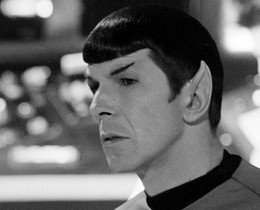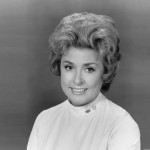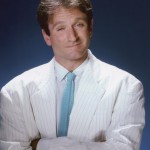 Actor Leonard Nimoy portrayed one of the most iconic characters on television — Mr. Spock on “Star Trek” — but his character was nearly buried in the background of the series after NBC marketing executives worried that his pointy-eared character would irk viewers.
Actor Leonard Nimoy portrayed one of the most iconic characters on television — Mr. Spock on “Star Trek” — but his character was nearly buried in the background of the series after NBC marketing executives worried that his pointy-eared character would irk viewers.
“[Marketing executives] worried that people in the Bible Belt might be offended and wouldn’t want a devilish character coming into their homes on their TV sets,” Nimoy says “Star Trek” creator Gene Roddenberry told him.
Instead, viewers found the enigmatic, saturnine Spock fascinating, and he soon became a breakout star on the sci-fi series. Nimoy says his competitive chemistry with William Shatner, who portrayed Captain James T. Kirk and was already a well-known actor, accounts for some of the success.
“We were like brothers,” says Nimoy of his co-star Shatner. “Sibling rivalry, you know. And sometimes it was very funny, sometimes it got tense, but it was always interesting. I think it helped.”
Nimoy says the balance the writers struck between the flamboyant, emotional Captain Kirk and the monotone, scientific Spock helped catapult “Star Trek” to critical acclaim.
“Bill [Shatner] brought a tremendous energy to the show,” Nimoy says. “What he did was attack a scene and attack the action, and I, as Spock, kind of cocked an eyebrow and made my comment quietly.”
Leonard Nimoy’s Early Life
Nimoy’s interest in acting developed at a very young age, growing up in Boston with his Orthodox Jewish parents who had emigrated from the Ukraine. Nimoy’s grandfather encouraged his interest in the stage arts, and the young actor took drama classes at Boston College in the 1950s. But a stint in the army during the Korean War intervened, and Nimoy didn’t finish. Instead, the young actor assumed many small roles in television serials and movies. Nimoy first worked with his future co-star and friend Shatner in a crime drama episode of “The Man from U.N.C.L.E.” in 1964. The two met again when Shatner was cast in the well-received pilot episode for “Star Trek.”
“The show valued education, it valued teamwork, and it valued loyalty. [“Star Trek”] was forward-looking, always, just by its very nature. And I think those things appealed,” says Nimoy.














































